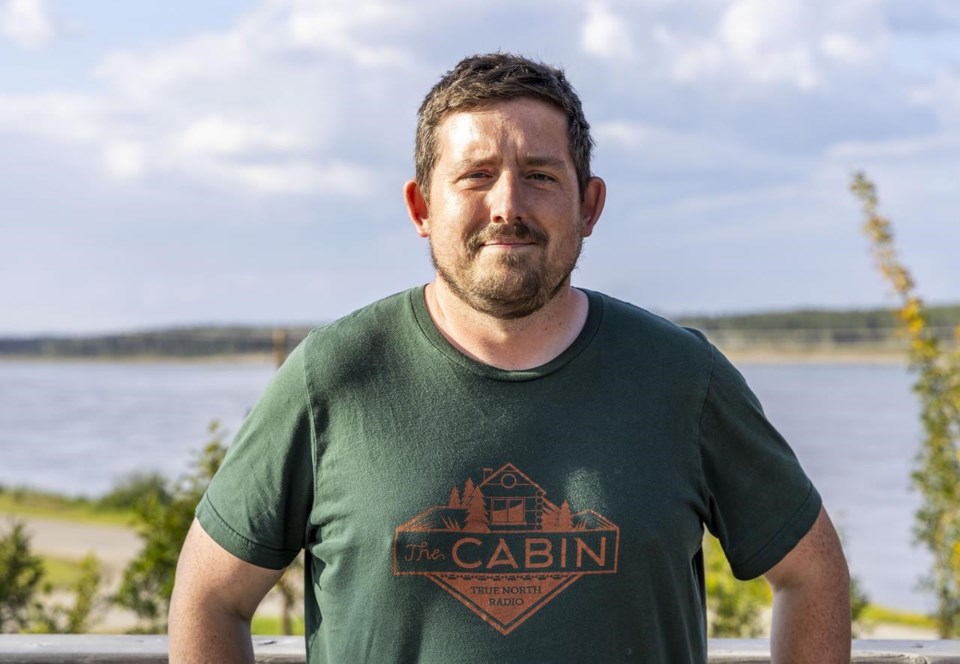As thousands of terrified people packed up their belongings last week after an evacuation order in Yellowknife, N.W.T., local news site Cabin Radio was providing line-by-line, minute-by-minute updates on where to go and what to expect.
Ollie Williams, a former BBC sports reporter, wrote many of those lines from inside a pickup truck on which sat a satellite dish held steady by heavy bags of dog food. He was fleeing, too.
He helped launch Cabin Radio in 2017, a few years after he moved to Yellowknife, the capital of the Northwest Territories, with a woman he met while covering the 2010 Vancouver Olympics.On Sunday night, as he spoke from an inn about 630 kilometres away in Fort Simpson, N.W.T., he had no regrets.
"If I wasn't doing the reporting I think I would have probably have struggled a lot more, mentally," he said in an interview. "The job that I have is one that I love. I built myself a journalism role that was custom-designed to be one that I wanted to do. And this is the ultimate stress test."
Cabin Radio has become a lifeline for people in the Northwest Territories who need immediate and accurate information as raging wildfires threaten their homes and communities. In local Facebook groups, people post screenshots of Cabin Radio articles, or copy and paste the text. Meta is blocking Canadian news content to protest federal policy, and the Cabin Radio team encourages the workarounds.
Outside of the territories, audiences have come to understand just how frightening the situation is through Williams's interviews with national and international media outlets, including the BBC.He explains that the roughly 20,000 people evacuated from Yellowknife represent about half the population of the northern territory. Those that flee by road, he says, must drive for hours along remote highways surrounded by rocks and evergreens before they reach the next community where they might be able to sleep.
"I think it helps to get a sense of who the audience is and particularly, as a British kid, to know that we're dealing with matters of scale here that do not translate to a European audience," he said.
Williams founded Cabin Radio with four other people — Andrew Goodwin, Scott Letkeman, Sarah Pruys and Jesse Wheeler — to fill what they perceived as a hole in the media coverage of the Northwest Territories, he said. It seemed to him an interesting challenge to build an outlet that brought the speed and production value of the BBC's coverage to a small community.
"Accurate, responsible, reliable and robust local journalism is one of the hardest arts available, and also one of the most enjoyable when you get it right," he said. "Because that's when you make a difference to a community."
Working for the BBC, he could have "dropped off the face of the Earth and nobody would have batted an eyelid," he continued. But he and the Cabin Radio team make a tangible difference. "We probably helped some people in a really dire situation where people had every reason to be very panicked and worried and stressed," he said. "And that is what local journalism should always be about."
Rene Roy agrees. He's the editor-in-chief of the Wreckhouse Weekly, a small local paper in Port aux Basques, N.L., a town of about 3,500 people on Newfoundland's southwest tip. Last year, as post-tropical storm Fiona bore down on his community, Roy snapped a photo of a blue house dangling over the edge of the ocean. The picture was published in news outlets as far away as Kuala Lumpur, he said, showing the world how changing weather patterns upended lives in a far-away town.
Roy took the picture as he was escaping the surging water himself. He and his two-person team then spent 20 hours a day for the next two weeks filing stories and updates to keep people informed about evacuations and help.
"Necessity" fuelled those long days, he said in an interview.
"If you care about where you work and you care about your community where you're based, then you need to try to help," Roy said. "The whole basis of it is the necessity of trying to get information out to help people, to save lives, to get them to an evacuation centre."
Patricia Elliott, a journalism professor at the First Nations University of Canada, says local community news outlets should be considered and funded as "critical infrastructure," like highways or telephone lines, especially as climate change is expected to bring more frequent weather emergencies.
"Nobody can quite duplicate what they do," she said in an interview. "They are where people turn — to their local radio station, to their local paper — for solid information in times of crisis."
These outlets proved especially crucial in remote Indigenous communities during the COVID-19 pandemic and during this summer of unprecedented wildfires, she said. Often, they were the only place residents could get reliable information in their language.
"These radio stations have been limping along on one-off grants," Elliott said. "There's no solid universal funding to keep them going."
First Nations University launched a program last year specifically aimed at training community journalists who can continue this work, she said.
Back in the Northwest Territories, Williams has clear advice for anyone looking to support local media.
"Find a local news outlet that you can trust and support it in every way you can," he said. Though the media outlets themselves have a role to play, too, he added.
"You've got to deliver, and you've got to deliver consistently, and it's got to become almost a calling to do this," Williams said. "Because that's how you convince an audience that when this sort of thing happens, you're the place they're going to go."
This report by The Canadian Press was first published Aug. 22, 2023.
Sarah Smellie, The Canadian Press



